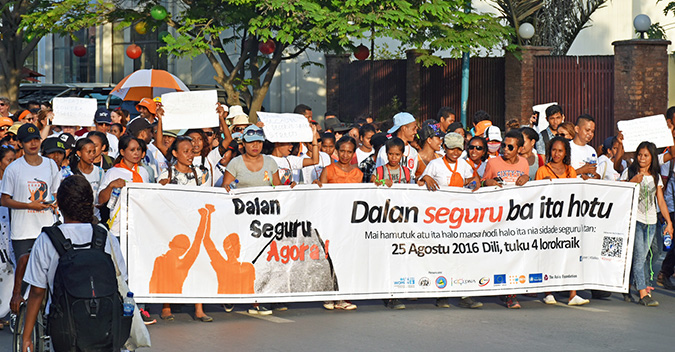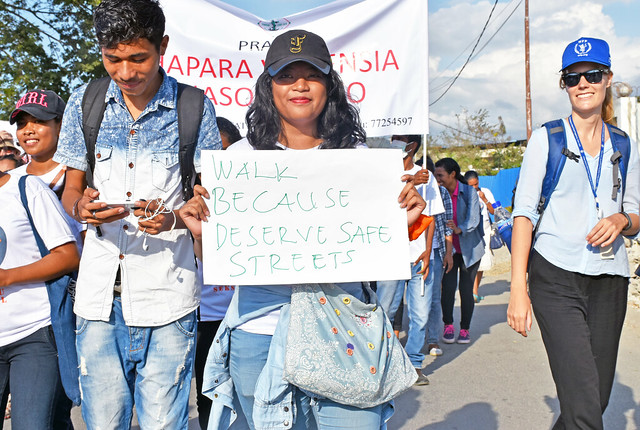Marching against Sexual Harassment: Another Struggle for Freedom
Date:
Author: Felix Maia
Dili, Timor-Leste – Hundreds of people have marched in the streets of Timor-Leste’s capital to demand an end to sexual harassment. It was a protest against oppression that activists linked to the country’s struggle for independence.
About 600 men, women, youths and children of many different backgrounds flowed through the city centre before the afternoon rush hour in the 25 August march organized by UN Women. They chanted, sang, and shouted for an end to sexual harassment, and carried a banner that said, “Safe Streets Now!”
There should be no more people oppressing other people’s freedom to walk in the street safely – this is why we fought for independence in the first place,” said Judite.

Ximenes, President of the Board of Rede Feto, an umbrella network of women’s organizations, and a former Parliamentarian and resistance activist.
“This walk is very important for us because if we never address the violence towards women, then we will never achieve a just society,” she told the crowd.
Timor-Leste achieved independence in 2002 after a long and bloody struggle against Indonesian occupiers and before that, the Portuguese colonialists.
Bella Galhos, a political activist and advisor to the President of the Republic, also connected the independence struggle with the importance of stopping street harassment for the sake of the country’s future.
“It is not too late if each of us and collectively, starting from home and in our communities … are able to learn to respect each other and our nation,” she said. “It is not only about being democratic, but also … respect for one another and love for one another.”
“Streets are genderless, streets are sexless, streets are ageless, and streets are for everyone!” she told the crowd.
And Sunita Caminha, UN Women’s Deputy Country Representative in Timor-Leste, said: “Even though we use the same streets, the streets are not equally open and accessible to all. Often, our female friends share stories of hearing foul remarks when walking past men on the street. The words are embarrassing, they make us want to pretend we cannot hear. But our ears hear clearly, and it is hard to forget those words.”
Sexual harassment is widespread in Timor-Leste, but little reported. People feel ashamed to tell others about their experiences. Or they don’t know where they should report complaints. Or they don’t have the support of family members and friends. And many feel that the authorities simply do not take sexual harassment seriously.
The march allowed people to tell others about their experiences with harassment, and to receive assurances that it was not their fault that they were targeted. The event also informed people about where they can find support if they are victimized and what measures can be taken to prevent and stop such incidents. These measures include educating young people to respect others, and training public servants to be aware of incidents of sexual harassment and violence, and to make laws and policies to stop them, especially in the schools and public places.
Joining the march were diverse people such as LGBTI groups, United Nations workers, university students, civil society groups, and business people. They gathered in a public park and marched for about an hour to another public park for a rally. There, people marked on a large map the streets where they felt most insecure, and watched dance and hip-hop performances that echoed the call for safe streets for all.
The march was organized in partnership with local civil society groups including Rede Feto, The Asia Foundation, Association of Men against Violence, Coalition for Diversity in Action, Fokupers, Patria, Alumni of Youth Parliament, and many other groups involved in health, education, social issues and justice. It was also supported by other United Nations agencies including the United Nations Population Fund and UN Human Rights. Funding was provided by the European Union and the Governments of Australia and the United States.
Photo Gallery
Media Contact:
Please contact: Felix Maia
Communications Officer, UN House, Rua de Caicoli, Dili, Timor-Leste.
Mob: +670 7833 9440 Email: [ Click to reveal ]
